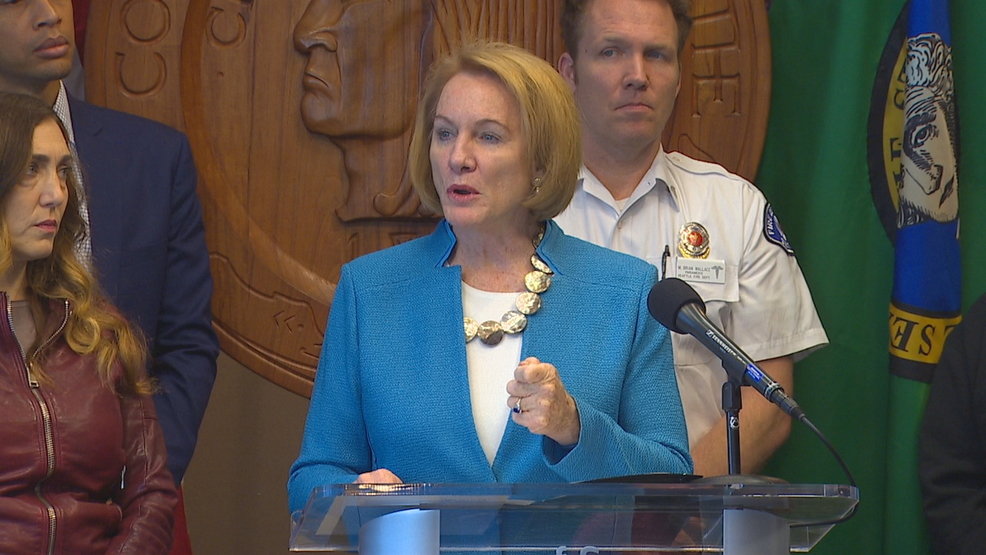Seattle mayor announces new efforts to combat growing fentanyl crisis

SEATTLE — The city of Seattle announced new efforts Thursday morning to battle a growing fentanyl and counterfeit pill crisis in the area.
Mayor Jenny Durkan said officials will host 25 naloxone trainings to distribute 700 naloxone kits purchased by the city. Nalaxone or "Narcan" is a nasal spray used to reverse an opioid-involved overdose.
Durkan said the kits will combat an illicit fentanyl market growing exponentially in the area.
The Seattle Police Department seized 187 fentanyl pills in 2018, a mark that increased to 227,924 pills in 2019.
In less than a month this year officers have seized 41,000 fentanyl pills off Seattle's streets, putting the city on pace for 492,000 for the year.
“Fentanyl and counterfeit oxycodone pills laced with fentanyl are spreading throughout our communities, and we must continue to combat this growing crisis," Durkan said. "Naloxone can reverse overdoses - these kits can truly save people’s lives. We’re working with our partners to make sure this medication can get into the hands of people who may need it, from our Seattle Public Schools nurses, to our frontline service providers, to people who work with those involved in the criminal legal system. I also want to extend my deepest gratitude to Deborah Savran, David Lilienthal, and Jed Kaufman. In the midst of their grief, they were willing to share their story to save others.”
Durkan told her staff to design a strategy to handle an increase in counterfeit pills after she received a letter from Deborah Savran, David Lilienthal, and Jed Kaufman, the mother, father, and stepfather of Gabriel Lilienthal, the Ballard teenager who died Sept. 29, 2019 after unknowingly ingesting a fentanyl-laced, counterfeit prescription pill.
Authorities said the teen purchased a fentanyl-laced street drug called M30 that looks like oxycodone and is as many as 50 times more powerful than raw heroin.
Gabriel was one of eight confirmed King County teenagers who passed away due to fentanyl-laced pills in 2019.
“Fentanyl is like a serial killer on the street," Savran said. "In many cases, people don’t realize they’re taking a drug that is exponentially more powerful than heroin,” said Deborah Savran and Jed Kaufman. “During these dark days, we have felt compelled to speak out because so many people – parents and kids – don’t know the danger posed by these counterfeit pills. We need to have more harm reduction resources available. But we also need to have an open and honest conversation about the dangers of fentanyl, and the work we all need to do together to stop the spread of this drug.”
District 6 Councilmember Dan Strauss said citizens need substance misuse, prevention and rehabilitation resources in our community and throughout the city.
“If this can happen to a ‘straight A’ student it can happen to anyone and any family," Strauss said. "We must turn Gabe’s tragedy into triumph, for his family and our community.”
Deadly counterfeit pills made to look like pharmaceuticals such as oxycodone but are laced with fentanyl are a growing problem in Washington state.
The Mayor's Office said in a release most fentanyl pills are trafficked in through the same routes as heroin, cocaine, and methamphetamine.
The Seattle Police Department is working with partners at the King County Sheriff’s Office, the Drug Enforcement Agency, and the Federal Bureau of Investigations to conduct ongoing investigations into fentanyl trafficking.
At Durkan's direction, the city is investing in harm reduction strategies to mitigate the effect of the country's opioid epidemic.
An existing program will continue to train business owners and workers in the nightlife sector on how to recognize the signs of an overdose and administer naloxone.
Seattle Public Schools (SPS) will receive one training to ensure all 90 nurses will be fully trained to administer naloxone. Safety and security team with public schools will receive naloxone training as well.
 Pathways Drug Rehabilitation Luxury Addiction Treatment & Detox Center
Pathways Drug Rehabilitation Luxury Addiction Treatment & Detox Center


